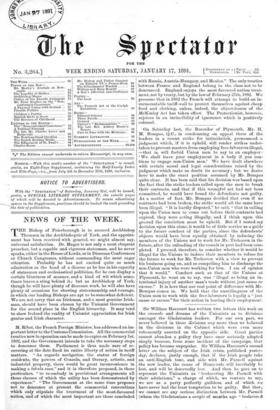On Saturday last, the Recorder of Plymouth, Mr. H. M.
Bompas, Q.C., in condemning on appeal three of the leaders in a recent strike for intimidatioh, pronounced a judgment which, if it is upheld, will render strikes under- taken to prevent masters from employing free-labourers illegal, —that is, will forbid Union men to say to an employer : We shall leave your employment in a body if you con- tinue to engage non-Union men.' We have dealt elsewhere with certain moral and legal considerations raised by the judgment which make us doubt its accuracy ; but we desire here to make the exact position assumed by Mr. Bompa.s quite clear. It has been said that his decision was based upon the fact that the strike leaders called upon the men to break their contracts, and that if this wrongful act had not been committed, he would have found the defendants not guilty. As a matter of fact, Mr. Bompas decided that even if no contracts had been broken, the strike would all the same have been illegal. " It is hardly disputed," he said, " that in calling upon the Union men to come out before their contracts had expired, they were acting illegally, and I think upon this ground the conviction must be upheld. But if I rested my decision upon this alone, it would be of little service as a guide to the future conduct of the parties, since the defendants' objects would have been equally obtained by inducing the members of the Unions not to work for Mr. Treleaven in the future, after the unloading of the vessels in port had been com- pleted. I proceed, therefore, to consider whether it would be illegal for the Unions to induce their members to refuse for the future to work for Mr. Treleaven with a view to prevent his business going on, and so compelling him to discharge the don-Union men who were working for him. I am of opinion that it would." Conduct such as that of the Unions at Plymouth, he went on to say, was " illegal as being an in- tentional injury of another man's trade without just cause or excuse." It is here that our real point of difference with Mr. Bompas comes in. We hold that the unwillingness of the Union men to work with the free-labourers is legally a " just cause or excuse " for their action in leaving their employment.






































